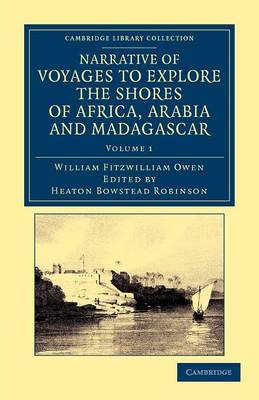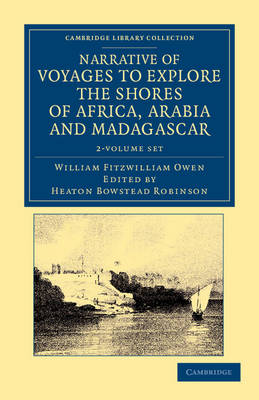Cambridge Library Collection - African Studies
1 primary work • 4 total works
Volume 1
Narrative of Voyages to Explore the Shores of Africa, Arabia, and Madagascar
by William Fitzwilliam Owen
Published 28 June 2012
William Fitzwilliam Owen (1774–1857) was a British naval officer. Between 1821 and 1826 he commanded an expedition to Africa, Arabia and Madagascar with the Royal Navy ships Leven and Barracouta, during which he mapped some 30,000 miles of coastline. His memoirs of the voyage are presented in this two-volume account, first published in 1833. Volume 1 begins by presenting Owen's instructions from the Lords Commissioners of the Admiralty and the Hydrographical Office, on which the editor comments that Owen was not given the power to take account of seasonal climate changes. Through Owen's recollections we learn that this proved fatal, as many of his crew succumbed to tropical diseases. Providing a vivid account of African exploration in the nineteenth century, Owen also documents his encounters with native peoples and wildlife. His writings remain of great interest to geographers, historians and anthropologists.
William Fitzwilliam Owen (1774-1857) was a British naval officer. Between 1821 and 1826 he commanded an expedition to Africa, Arabia and Madagascar with the Royal Navy ships Leven and Barracouta, during which he mapped some 30,000 miles of coastline. His memoirs of the voyage are presented in this two-volume account, first published in 1833. In Volume 1, Owen describes the native peoples and wildlife he encountered, and the tragic deaths of many of his crew from tropical diseases. In Volume 2, he describes colonial life, native rituals, missionaries, slavery and the virulent tropical illnesses to which many of his crew succumbed.
William Fitzwilliam Owen (1774-1857) was a British naval officer. Between 1821 and 1826 he commanded an expedition to Africa, Arabia and Madagascar with the Royal Navy ships Leven and Barracouta, during which he mapped some 30,000 miles of coastline. His memoirs of the voyage are presented in this two-volume account, first published in 1833. Volume 1 begins by presenting Owen's instructions from the Lords Commissioners of the Admiralty and the Hydrographical Office, on which the editor comments that Owen was not given the power to take account of seasonal climate changes. Through Owen's recollections we learn that this proved fatal, as many of his crew succumbed to tropical diseases. Providing a vivid account of African exploration in the nineteenth century, Owen also documents his encounters with native peoples and wildlife. His writings remain of great interest to geographers, historians and anthropologists.
William Fitzwilliam Owen (1774-1857) was a British naval officer. Between 1821 and 1826 he commanded an expedition to Africa, Arabia and Madagascar with the Royal Navy ships Leven and Barracouta, during which he mapped some 30,000 miles of coastline. His memoirs of the voyage are presented in this two-volume account, first published in 1833. Volume 2 continues to describe the rituals of the native peoples whom Owen's crew encountered - and who were at times hostile - and the tragic deaths on board the ships from tropical diseases, which with better planning might have been avoided. The volume also covers the lives of colonists and missionaries, the slave trade, and the spread of European influence across Africa and its neighbouring lands. Providing a vivid account of African exploration in the nineteenth century, Owen's writings remain of great interest to geographers, historians and anthropologists.


